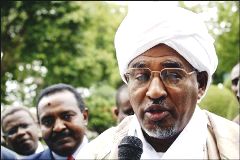Sudan’s govt blames US for collapse of Darfur peace talks
DOW JONES NEWSWIRES
ABUJA, Nigeria, Sep 15, 2004 (AP) — The Sudanese government blamed the U.S. for Wednesday’s collapse of peace talks with rebels from the troubled Darfur region.
 Both sides said the talks had collapsed, although they left open the possibility of trying again after a halt of at least three weeks.
Both sides said the talks had collapsed, although they left open the possibility of trying again after a halt of at least three weeks.
Sudan’s government – under growing threat of international sanctions over 19 months of violence in Darfur – insisted U.S. criticism had heartened rebels past the point of compromise.
Sudan’s top negotiator cited U.S. Secretary of State Colin Powell’s declaration last week that Sudan ‘s government and allied militia had committed acts of genocide against Darfur’s non-Arab villagers.
“The attitude of Colin Powell and America generally was the main cause of the stalemate,” Sudanese envoy Majzoub al-Khalifa Ahmad told The Associated Press.
“It sent a wrong message to the rebels, and that resulted in their hardening their position at the talks,” Ahmad said, insisting Sudan ‘s problems “will never be solved from outside Africa.”
“It’s unfortunate they’ve become intransigent,” the Sudanese negotiator said of the rebels. “They should be held responsible for this result we’re seeing, the breakdown of the talks.”
Rebels said Sudan ‘s government was seeking security concessions in the talks that would end only with the insurgents’ annihilation by government forces.
Talks had made virtually no progress since their Aug. 23 launch in Nigeria’s capital, Abuja, under sponsorship of the 52-nation African Union.
Rebels and the government said they were open to an African Union proposals to come back to negotiations in what could be as little as three weeks.
Ahmad also insisted disarmament of the Janjaweed already was under way, and would continue.
“Disarming the Janjaweed is a continuous process. The rebels also need to be placed in safe areas because they’re also attacking civilians. They’re the same as the Janjaweed, there’s no difference,” Ahmad said.
A first try at talks, in July in Ethiopia, also ended with no deal. An April cease-fire has been largely ignored, despite the presence of about 80 African Union military observers backed up by 300 African troops.
